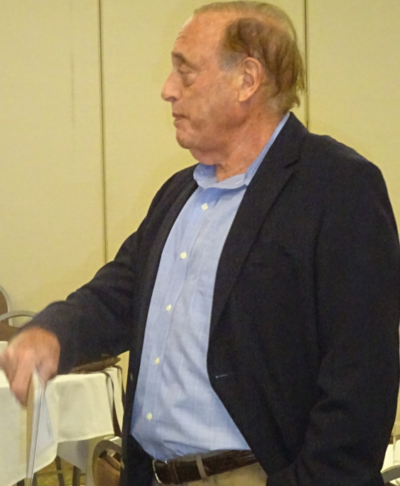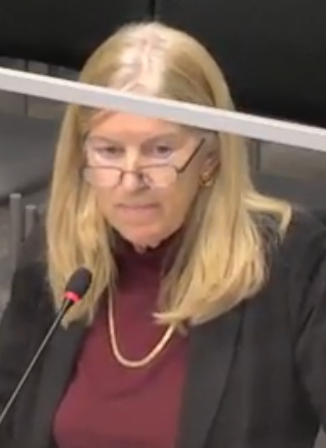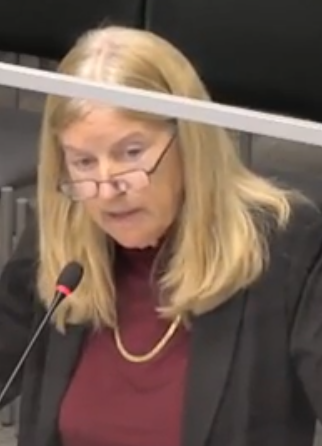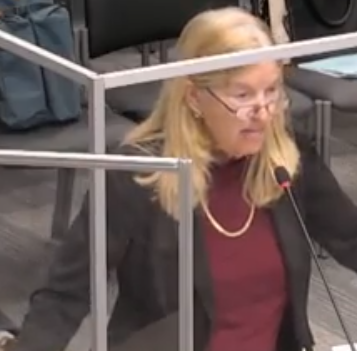 By Staff
By Staff
April 19th, 2023
BURLINGTON, ON
Janice Atwood, a partner with Principle Integrity explained what the firm did and why they did what they did when a complaint was brought to them about the behaviour of a member of the Committee of Adjustments.
The member is a knowledgeable and no doubt dedicated member of the Committee of Adjustment however, members are appointed to the city’s boards and are required to meet the standards regarding conduct. The parties that come before the committee of adjustment have a very reasonable expectation that they will be treated fairly the complainant reasonably raised her concern through this complaint process and sought to hold the member accountable for the standards set out in the code. And in our view, this is the result well a member of a committee of adjustment has broad jurisdiction under the legislation to consider the evidence and apply the law to the facts.

Committee of Adjustments member Nick Leblovic

Janice Atwood, Burlington Integrity Commissioner reported on complaint that the member had made statements at the hearing that were unfounded and false.
They do not have omnipotent powers to adduce their own evidence, nor to take judicial notice of facts that are heard third hand untested, unchallenged and without notice. If such were the case, the value of a public hearing would be largely defeated. It cannot be correct that there is no recourse regarding conduct of members of the Committee of Adjustment other than an appeal to a land tribunal. If that were the case, the member whose conduct disclosed for example, bias or undue influence or who even had a conflict of interest would be at liberty to engage in such conduct without consequence.
The complaint which we received on December 22, was that the member had made statements at the hearing that were unfounded and false. And that the member was engaging in what she perceived as malicious gossip, which risked influencing the outcome of the matter. And derailing the culmination of what was to her lengthy and costly process.
I won’t belabour the details of the report and drag you tooth and nail through them but suffice to say that this is, in essence a story of a longtime resident now living alone, seeking to turn her detached garage into a secondary suite in the back of the large home and the tribunal member trying to block her because according to an unidentified neighbour who is a friend of the members, she has been illegally renting out a basement apartment for years of fact, which she vehemently denies.
Taken aback by the misinformation, the homeowner wanted the member to resign his role. She discovered that both staff and Council were powerless to intervene in the conduct of members of a committee of adjustment. The tribunal member as a lawyer himself has criticized our investigation as lacking jurisdiction, because in his view, we are presuming to review the conduct of the adjudicator of bodies hearing. We are not. We agree that it is beyond the jurisdiction of an Integrity Commissioner to review the hearing process of the Committee of Adjustment.
However, it is well established that the conduct of members of local boards, including the Committee of Adjustment falls squarely within the jurisdiction of the Integrity Commissioner to review. In fact, it is only the Integrity Commissioner in this instance, who has authority to review and make findings on the conduct of individual members of a committee.
The there’s a lengthy chronology of correspondence back and forth, largely the respondent raising a number of preliminary objections and continuously resisting our investigation. And then our responses back and I will simply read you from one of the very earliest pieces of correspondence back January 5, where we had dealt with some of the preliminary objection objections and said concluded that January 5 letter with if you believe a conversation would be helpful. We would be pleased to arrange that although we would appreciate first receiving your written response to the allegations in the complaint. Never at any time have we declined or refused to have a conversation with a member never has he asked us.

Janice Atwood: “The member was impugning the professional ethics of the Planning Consultant.”.
The code of conduct for local boards sets out that members shall act with honesty and integrity serving in a diligent manner and performing their duties in a manner which promotes public confidence. adjudicate of boards are arm’s length and quasi-judicial and must the members must conduct themselves as such. Referring to what a neighbor has told him was not appropriate. It was nothing more than hearsay. It was not relevant. And even if relevant, it is not the role of the members to adduce their own evidence. A site visit, which often members of Committee of Adjustment are encouraged to make enables members to make observations firsthand. A members own firsthand observations are not hearsay. They are the members own firsthand observations. Hearsay is hearing something third hand from somebody who does not come forward to say it themselves. And this is what happened in this case.
I will read you very briefly from the members written response of January 20 to us.
“We also have some close friends who live in the immediate vicinity of the property and who are aware that I’m a member of the committee several years ago I learned from one of these friends that the complainant was planning to convert the garage on the property into a secondary dwelling unit. They asked me if this was coming to the committee for approval and I told them that I was not aware of an upcoming hearing on the project, but would let them know if and when the matter came forward.”
We have pointed out in the report notably the basement finishes do not even include a kitchen in questioning the integrity of the planning consultant during the hearing, the member was impugning her professional ethics.
He very clearly stated:
“I am questioning the integrity of the planning consultant. There is no video of the meeting. And as far as we are aware, no audio recording, at least none which was available when we sought it.
We don’t doubt that there isn’t an audio recording. However, we did conduct interviews so we are satisfied that our findings are well founded. This is not conduct which promotes public confidence as sometimes happens in our investigations and thankfully it’s very few some respondents take an extremely legalistic adversarial approach.
Our goal in investigating a complaint is aimed at upholding the expectations set by counsel for its appointees. The investigation was conducted following the tenants of procedural fairness, providing the respondent with an open ended opportunity to respond to the allegations and tour findings.
As you know, as part of our process, we provide our preliminary draft findings in complete except we don’t include the final recommendation but the entire report is provided to the respondent in confidence. Well before we finalize it and we seek any further submissions and comments significantly.

Janice Atwood: We optimistically believe that the member will … conduct himself somewhat differently.”
Nowhere does the member justify his discussing the case with others, by which he apparently heard of the gossip and members of adjudicate of tribunals, such as the Committee of Adjustment are not immune from review, for conduct for breaches of their code of conduct. That jurisdiction is well recognized. If no mechanism for complaints were available, there would be no recourse. Ultimately, we did not believe removal was necessary. Although certainly the complainants thought that we think the investigation may be sufficient to remind members to refrain from contributing to or giving credibility to gossip during an adjudication of a hearing and to treat those who appear before them with professionalism and respect. Notwithstanding the lack of awareness or lack of contrition from the member.
We optimistically believe that the member will if circumstances such as these were ever to arise again. We’ll conduct himself somewhat differently. We I’m the optimistic partner in the firm.
 We do also observe that there’s an opportunity for the Integrity Commissioner to provide some ethical training for members of local boards. And we think all of those members would serve would be well served with that. We don’t think that it’s necessarily a legalistic training session on the rules of evidence and hearsay. We really think that there are some very basic principles that members of adjudicate of boards for example ought to be reminded of and that is, you hear the evidence that’s provided you review the report that’s provided you may ask your questions, but you do so in a courteous manner. These are basic principles that they don’t require illustrious Bay Street lawyers to be reciting to your volunteers on your various committees.
We do also observe that there’s an opportunity for the Integrity Commissioner to provide some ethical training for members of local boards. And we think all of those members would serve would be well served with that. We don’t think that it’s necessarily a legalistic training session on the rules of evidence and hearsay. We really think that there are some very basic principles that members of adjudicate of boards for example ought to be reminded of and that is, you hear the evidence that’s provided you review the report that’s provided you may ask your questions, but you do so in a courteous manner. These are basic principles that they don’t require illustrious Bay Street lawyers to be reciting to your volunteers on your various committees.
These are very basic principles. Most of them fall under the golden rule, treat others as you would have them treat you. So with that said, I’m happy to answer whatever questions you may have.



















“I will read you very briefly from the member’s written response of January 20 to us.
“We also have some close friends who live in the immediate vicinity of the property and who are aware that I’m a member of the committee. Several years ago I learned from one of these friends that the complainant was planning to convert the garage on the property into a secondary dwelling unit. They asked me if this was coming to the committee for approval and I told them that I was not aware of an upcoming hearing on the project, but would let them know if and when the matter came forward.”
!!!!
And here, in my opinion, is Exhibit A on why these Committees of Adjustment should be overhauled province-wide. A small group of unelected citizens shouldn’t have the power to decide whether a friend’s neighbour should or should not be able to get a variance.